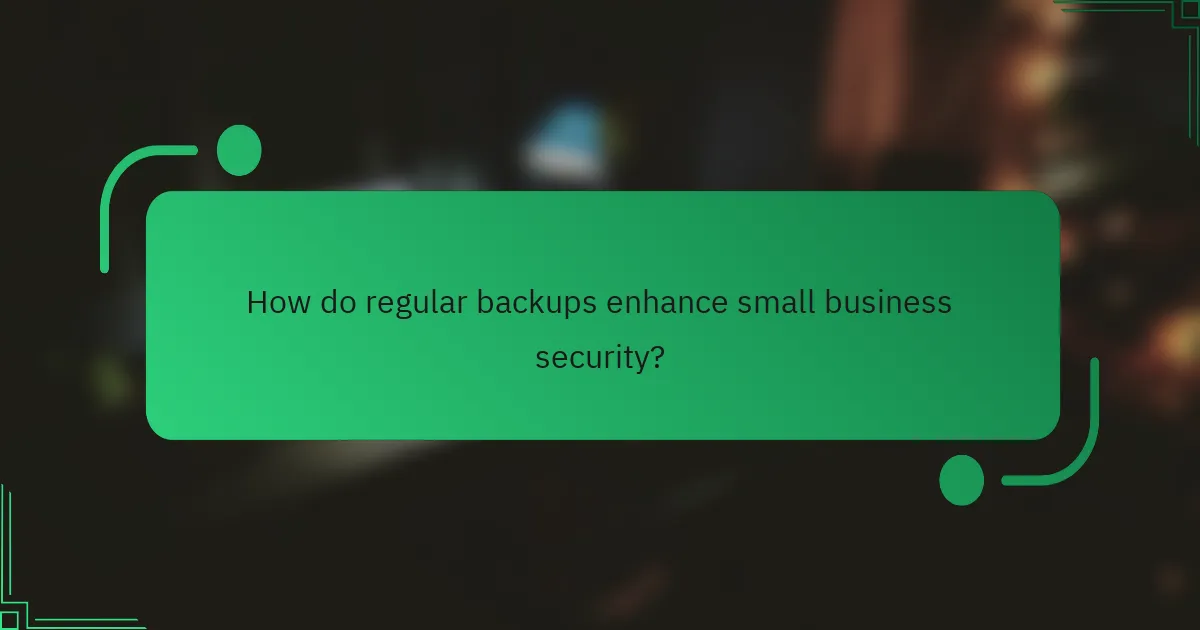When selecting a web hosting service for your small business, prioritising security features like regular backups is essential. These backups not only safeguard your critical data but also provide peace of mind against potential cyber threats and data loss. Additionally, incorporating elements such as SSL certificates and malware scanning can further enhance your website’s security and reliability, ensuring a trustworthy online presence.

What are the best web hosting services for small business security in the UK?
The best web hosting services for small business security in the UK offer robust features like regular backups, SSL certificates, and strong customer support. These services ensure that your website remains secure and your data is protected against potential threats.
SiteGround
SiteGround is renowned for its strong security measures, including daily backups and advanced firewall protection. Their managed WordPress hosting includes automatic updates and a built-in security plugin that monitors for vulnerabilities.
Small businesses can benefit from SiteGround’s proactive approach to security, as they offer a 99.99% uptime guarantee and 24/7 support. This ensures that any issues are promptly addressed, minimising downtime and potential losses.
Bluehost
Bluehost provides essential security features such as free SSL certificates and daily backups, making it a solid choice for small businesses. Their hosting plans include a comprehensive security suite that protects against malware and spam.
With a user-friendly interface and 24/7 customer support, Bluehost is ideal for small business owners who may not have extensive technical knowledge. Their competitive pricing and reliable performance further enhance their appeal.
HostGator
HostGator offers a range of security features, including free SSL certificates and automatic backups. Their Hatchling plan is particularly suitable for small businesses looking for an affordable yet secure hosting option.
Additionally, HostGator provides a website builder that includes security features, allowing users to create and maintain secure websites without needing advanced technical skills. Their 99.9% uptime guarantee ensures that your site remains accessible to customers.
UK2.net
UK2.net focuses on providing secure web hosting solutions tailored for UK businesses. They offer daily backups, DDoS protection, and a range of SSL options to safeguard your online presence.
With a commitment to customer support, UK2.net provides assistance to small businesses in navigating security concerns. Their competitive pricing and local data centres ensure compliance with UK regulations, enhancing trust among customers.
Fasthosts
Fasthosts is known for its strong emphasis on security, offering features like free SSL certificates and regular backups. Their hosting plans include advanced security tools to protect against cyber threats, making them a reliable choice for small businesses.
Fasthosts also provides a user-friendly control panel that simplifies website management, allowing business owners to focus on growth rather than technical issues. Their 24/7 support ensures that help is always available when needed.

How do regular backups enhance small business security?
Regular backups significantly enhance small business security by ensuring that critical data is preserved and can be restored in case of data loss or cyber incidents. This proactive approach mitigates risks associated with hardware failures, accidental deletions, or ransomware attacks.
Automated backup solutions
Automated backup solutions streamline the process of data protection, allowing businesses to schedule regular backups without manual intervention. These systems can be configured to run daily, weekly, or monthly, depending on the volume of data and business needs.
Popular options include cloud-based services like Google Drive, Dropbox, or dedicated backup solutions such as Acronis and Backblaze. When selecting a solution, consider factors like storage capacity, ease of use, and recovery options to ensure it meets your business requirements.
Data recovery processes
A robust data recovery process is essential for restoring lost information quickly and efficiently. This typically involves identifying the type of data loss, whether from accidental deletion, corruption, or a cyber attack, and then following a structured recovery plan.
Businesses should regularly test their recovery processes to ensure they can restore data within acceptable timeframes, ideally within a few hours. It is also advisable to maintain multiple backup copies in different locations to safeguard against localised disasters.

What features should small businesses look for in web hosting?
Small businesses should prioritise web hosting features that enhance security and reliability, such as SSL certificates, firewall protection, and malware scanning. These elements help protect sensitive data and maintain a trustworthy online presence.
SSL certificates
SSL certificates encrypt data transmitted between a website and its visitors, ensuring that sensitive information remains secure. For small businesses, having an SSL certificate is essential for building customer trust and improving search engine rankings.
When choosing a web host, look for options that offer free SSL certificates or easy integration with popular providers. Regularly check that the SSL certificate is up to date to avoid potential security warnings for users.
Firewall protection
Firewall protection acts as a barrier between a web server and potential threats from the internet. For small businesses, a robust firewall can prevent unauthorised access and mitigate risks from cyber attacks.
Consider web hosting providers that include managed firewall services, which automatically update and monitor for vulnerabilities. Regularly reviewing firewall settings and logs can help identify any unusual activity early.
Malware scanning
Malware scanning detects and removes malicious software from a website, protecting both the site and its visitors. Small businesses should ensure their web hosting includes regular malware scans to maintain security and avoid downtime.
Choose a hosting provider that offers automated malware scanning and immediate alerts for any detected threats. Additionally, implementing a backup strategy can help restore the website quickly in case of a malware incident.

How can small businesses implement effective backup strategies?
Small businesses can implement effective backup strategies by combining cloud storage and local backup solutions to ensure data redundancy and security. Regularly scheduled backups, alongside a clear recovery plan, are essential to protect against data loss.
Cloud storage options
Cloud storage offers a flexible and scalable solution for small businesses looking to back up their data. Services like Google Drive, Dropbox, and Microsoft OneDrive provide automatic syncing and accessibility from any internet-connected device, making it easy to retrieve files when needed.
When choosing a cloud storage provider, consider factors such as storage capacity, cost, and security features. Many providers offer tiered pricing based on storage needs, typically ranging from a few pounds per month for basic plans to higher amounts for larger capacities.
Local backup solutions
Local backup solutions, such as external hard drives or network-attached storage (NAS), provide a tangible way to store data securely on-site. These options allow for quick access and recovery, which can be crucial during a data loss incident.
For effective local backups, implement a routine schedule, such as daily or weekly backups, and ensure that backups are stored in a separate location to mitigate risks from physical damage or theft. Regularly test your backup system to confirm that data can be restored without issues.

What are the costs associated with secure web hosting in the UK?
The costs of secure web hosting in the UK can vary significantly based on the provider, features, and level of security required. Typically, businesses should expect to pay for monthly subscriptions and additional security features to ensure their websites are protected against threats.
Monthly subscription fees
Monthly subscription fees for secure web hosting in the UK generally range from £5 to £50, depending on the hosting plan and the level of security offered. Basic plans may include standard security measures, while premium options often feature enhanced protection against cyber threats.
When selecting a plan, consider the resources you need, such as storage space, bandwidth, and the number of websites you want to host. Some providers offer introductory discounts, so it’s wise to compare prices and features before committing.
Additional security features costs
In addition to monthly fees, businesses may incur costs for extra security features such as SSL certificates, firewalls, and malware scanning. SSL certificates can cost between £10 and £200 annually, depending on the type and provider.
Other security enhancements, like DDoS protection or regular backups, may be offered as add-ons, typically ranging from £5 to £30 per month. Assess your business needs to determine which features are essential for maintaining a secure online presence.